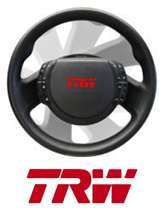TRW's Integrated Brake Control System Gains Heightened Customer Interest
 |
LOCKE TOWNSHIP, MI--Sept. 17, 2012: TRW Automotive Holdings Corp. is demonstrating its latest innovation in braking -- the Integrated Brake Control (IBC) system - at a customer event in Locke Township today. TRW's IBC is a vacuum independent technology which can simplify the brake system while enhancing performance.
Josef Pickenhahn, vice president, Braking Engineering commented: "Since we introduced this technology over a year ago, we've received significant interest from customers and now have development contracts running with major European vehicle manufacturers.
"The system offers excellent braking performance that will make a considerable difference, for example, when combined with future driver assist systems, such as radar and camera, to enable features such as Automatic Emergency Braking (AEB). With these functions becoming more important -- in particular with tougher Euro NCAP requirements for 5 star ratings and increased requirements for 'Top Safety Picks' in the U.S. - we believe that our IBC will be the braking solution of choice for the future."
The IBC replaces -- in a single integrated unit -- the electronic stability control (ESC) system along with the vacuum booster and the associated cables, sensors, switches, electronic controllers, and vacuum pumps where they are required for low-or no-vacuum configurations.
At the heart of the system is an actuator that is driven by an extremely fast-acting brushless electric motor. This is monitored by a rotary encoder that provides the control ECU with data on revolutions turned, rotational speed and position. Also integrated into the system is a separate hydraulic circuit designed to communicate the driver's braking intent to the system via an electronic signal while retaining the traditional feel of a hydraulically operated brake.
Pickenhahn continued: "The brushless electric motor gives the system its remarkable braking performance and ESC capability. This provides an exceptionally fast pressure rise rate which translates into a one g vehicle deceleration in less than 150 milliseconds."
IBC also offers considerable packaging and weight savings compared with current ESC systems -- weighing just under 4kg in contrast with 7 kg for a conventional component set. It is planned that TRW's IBC will be ready for production for 2016 model year applications.


